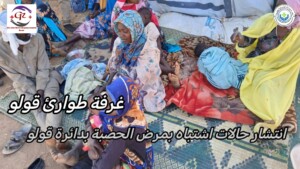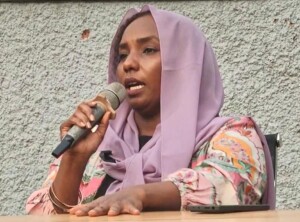Cholera spreading fast in South Darfur, no treatment available
Cholera infection rates have increased significantly in South Darfur’s East Jebel Marra and Kalma camp for the displaced. Camp elders report a severe shortage of medicines. The disease is still taking its toll in Central Darfur as well.
Cholera infection rates have increased significantly in South Darfur’s East Jebel Marra and Kalma camp for the displaced. Camp elders report a severe shortage of medicines. The disease is still taking its toll in Central Darfur as well.
A volunteer reported to Radio Dabanga that the isolation centre for cholera patients established by the South Darfur Ministry of Health in the area of Lebei in East Jebel Marra locality received 125 new cases on Thursday.
He praised the efforts exerted by the people in the area, in particular teachers and secondary school students.
They created teams that go from village to village to give information about the prevention of the infectious disease, and direct the residents to quickly transfer new cases to the isolation centre.
Rains
The number of cholera patients at Kalma camp near the South Darfur capital of Nyala has increased dramatically after the heavy rains of last week, Saleh Eisa, Secretary-general of the camp reported.
“Five people died and 101 new cases of cholera were recorded at the isolation centres in the camp on Wednesday and Thursday,” he said.
“There is a severe shortage of medicines, intravenous solutions, and perfusion salts in the health centres, in addition to a lack of chlorine for disinfecting the drinking water,” he said, and called on the World Health Organisation, the aid organisations working in the camp, and the Ministry of Health to provide the required items and medicines.
Kalma camp is one of the largest camps for the displaced in Darfur. It hosts more than 120,000 displaced. The first cases of cholera in South Darfur appeared in the camp about two months ago. Almost 700 camp residents have been infected. At least 45 of them have died of cholera.

Central Darfur
Ten cholera patients died and 20 new cases were recorded at the camps and villages near Zalingei, capital of Central Darfur, on Thursday and Friday.
El Shafee Abdallah, the Coordinator of the Central Darfur camps told Radio Dabanga that five people died of cholera and nine were newly infected in the Khamsa Dagayig camp for the displaced on Thursday and Friday.
“Hamidiya camp elders reported one death and four new cholera patients at the camp on Friday morning,” he said. “In Urogem village, south of Zalingei, four people died and seven new cases were reported.”
He noted that the number of cholera patients being treated at the isolation ward at the Zalingei Hospital reached 63 on Friday, and explained that most of the new cases consist of former patients’ attendants.
On Thursday evening, the isolation ward at the Nierteti Hospital received one new cholera patient. “Eight recovered patients left the hospital last week,” a medical source told this station on Friday.
“The number of cases remaining at the ward is seven,” he said. “The total number of people infected since the disease began spreading in the area, reached 49 cases. Four of them died.”
Gaps
The UN Office for the Coordination of Humanitarian Affairs (OCHA) reported in mid August that six localities in the state require isolation centres to be established as soon as possible.
“Humanitarian access and insecurity remain major challenges for the implementation of key health and protection interventions in the area [Central Darfur],” OCHA stated.
“Additionally, Nierteti's hospital faces gaps in medicines, including oral and intravenous re-hydration solutions… In Zalingei hospital, there are several sanitation issues, including lack of latrines and evidence of improper solid waste management…”
Epidemic
The National Epidemiological Corporation reported in early July that nearly 24,000 Sudanese have been infected and 940 cholera patients have died since the outbreak of the infectious disease in Blue Nile state in August last year.
The Sudanese authorities refuse to call the disease by its name, and refer to it as “Watery Diarrhoea”. The National Intelligence and Security Service has repeatedly warned medics and the press in the country not to make mention of cholera.
Follow #CholeraInSudan, #الكوليرا_السودان for ongoing coverage by Radio Dabanga











 and then
and then